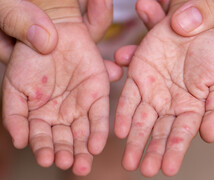Chest pain is a common complaint in children and adolescents. Chest pain is often perceived as “heart pain” both to children and their parents, and it can cause a lot of distress. However, chest pain in children is very rarely due to a heart problem and most often arises from a less worrisome source. Jennifer S. Li, MD, a Duke pediatric cardiologist, discusses common causes of chest pain in children
What causes chest pain?
Chest pain in children and adolescents is common, but is generally benign. However, chest pain with exercise or that is associated with fast heart beat, dizziness, or fainting can indicate a heart problem. Many structures located in the chest can cause or contribute to chest pain. Among these are the muscles, tendons, cartilage, or bones of the chest, lungs, heart, gastrointestinal system, and nerves. A problem in any one of these areas can cause chest pain.
How often is chest pain due to a heart problem?
In older adults, chest pain is frequently due to a heart problem. This is because heart disease mostly strikes older people.
In kids, chest pain is very rarely due to a heart problem. A prospective study in 50 children referred to a cardiology clinic showed that 76% had pain from the muscles, bones, or cartilage; 12% had exercise-induced asthma; 8% had pain from gastrointestinal causes; and 4% had pain due to psychogenic causes. Another study of 3700 children without previously known heart problems found a low incidence of heart problems (1%).
What about the kid who dies on the playing field?
While a lot of media attention is given to cases of sudden cardiac death in kids playing sports, these are extremely rare events among the millions of children and adolescents who participate in athletics. Many instances are related to previously undiagnosed underlying heart conditions. Because of this, it's important and necessary to have your child complete a sports physical before participating in competitive athletics.
Sometimes underlying conditions related to sudden cardiac death have genetic factors, so a careful family history is also an important part of the pre-sports evaluation.
What are some common causes of chest pain?
Some common causes include:
- Musculoskeletal: This is usually related to muscle strain or heavy lifting.
- Costrochondritis: Inflammation of the cartilage around the junction of the ribs to the breastbone.
- Precordial Catch Syndrome: Sharp stabbing chest pain below the breast that lasts a few seconds and is worsened by taking a deep breath. It may be due to a pinched nerve.
- Asthma: This is frequently a cause of exercise-induced chest pain.
- Gastroesophageal Reflux: Usually burning pain worsened while lying down after eating.
- Anxiety: Typically related to stress or excessive worry.
What are some heart-related causes of chest pain?
Several cardiac problems have the potential to cause chest pain. Some of these include:
- Left ventricular outflow tract obstruction (blockage of the outflow of the heart to the body): a heart murmur is present.
- Hypertrophic cardiomyopathy: usually an inherited condition causing a thickened heart muscle.
- Anomalous coronary arteries: coronary artery arising off of the wrong sinus, causing chest pain with exercise.
- Rhythm disturbances: chest pain is typically associated with the feeling of the heart beating too fast.
- Pericarditis: inflammation of the lining of the heart often preceded by a viral illness.
What are some worrisome symptoms of a heart-related cause of chest pain?
- Chest pain with exercise, associated with irregular or fast heart beat, or associated with dizziness or syncope (fainting) are symptoms that can indicate a serious heart problem.
- Chest pain in someone with a first-degree relative who has a history of sudden death or cardiomyopathy should be evaluated.
Chest pain that occurs at rest without other associated symptoms is not typically due to a heart problem.
What is the usual evaluation that is performed?
A careful history and physical examination are necessary and can usually identify the cause for the chest pain. Sometimes laboratory studies may be needed such as an electrocardiogram, an echocardiogram, or an exercise stress test.





